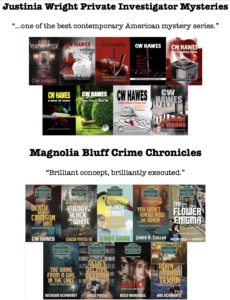Ten years ago I was 61. My wife had given me the okay to retire at 62 if I wished. And boy was I ever looking to retire and get out of the toxic county work environment that I’d endured for 30 years.
What I Wrote
In February 2014, I completed my massively sprawling post-apocalyptic epic The Rocheport Saga. A novel over 2200 handwritten pages long. The published seven volumes comprise about a third of the original manuscript. So there is lots more to add, if I decide to continue the saga.
In the spring and early summer of that year, I wrote Trio in Death-Sharp Minor and Festival of Death. The first two books in the Justinia Wright Private Investigator Mystery series.
During the summer, I wrote the first Lady Dru Drummond decopunk action-adventure novel: The Moscow Affair. And I edited Do One Thing For Me (a horror novelette) for publication.
Then I published the entire shooting match in November and December.
Dreamin’ of Riches
And like most writers, I immediately started dreaming about what I’d do with all the royalty money I’d be getting.
However, reality is a harsh mistress. And the money… Well, I quickly discovered that I was in the same league as the vast majority of fiction writers: we make very little to no money from our books. A sad tale, but true.
Although, I can say I am better off than many of my peers. Because, without any significant advertising, I have made at least $200 every year I’ve been at this indie writing/publishing gig. The operative phrase being without any significant advertising.
And last year, again without any significant advertising, I had my best year ever: pulling in around $630. Not a king’s ransom by any means. But I spent less than $30 in advertising and expended very little time hawking my books. The major “cost” was in writing, editing, and formatting — all which I did myself.
My hope is that one of these years before I die I’ll break that $1000 mark in income from my books. So stay tuned.
How to Make a Buck
One key to making a buck writing fiction these days is to orchestrate a massive advertising campaign, often to the tune of thousands of dollars. And hoping you sell enough books to break even. Few do. Even so, this is what almost all the gurus advise. Advertise, advertise, advertise.
Another tried-and-true method is direct sales. Man a booth at a fair, book festival, or convention.
I know authors who have actually sold many thousands of copies of their books doing so. The downside is that your weekends are tied up and you have to lug around curtains of your books. But you can make a living by selling direct. Just too busy and too much traveling for my liking.
Social Media
Generally speaking, social media is a bust. I haven’t gotten any book sale traction via social media for a few years now. In fact, I’ve pulled back severely on my social media involvement. The results aren’t worth the time investment.
Social media’s value, IMO, is in meeting other authors.
Kickstarter?
A venue not often mentioned by the gurus is Kickstarter. However, the platform is drawing name authors who are trying to generate sales and getting followers.
The success of Brandon Sanderson on the platform has kickstarted quite a few writers to give it a try. And when even unknown or little known writers pull in tens of thousands of dollars on their campaigns, it gives one something to think about.
Of course, there is work to organizing and conducting a Kickstarter campaign, but then there is work with everything. Except if you choose to do nothing. No work involved in that.
And this year…
So what’s on my docket for this year? Writing, of course. I’m also planning on giving Kickstarter a try. I’ll use the platform for the launch of my ninth Pierce Mostyn book. Nothing ventured, nothing gained.
But you won’t find me going to book fairs, conventions, and what not. I’m retired. I don’t need to make a buck at this venture. As one writer friend says, “I’m just writing for the larks.”
If you join my mailing list
All genres, but especially mystery:
https://dl.bookfunnel.com/dew2bf67hz
Horror:
https://dl.bookfunnel.com/aj2s8x1slq
you’ll find out the latest and greatest, maybe get some free stuff, and get curated content.
That’s all for now folks!
Comments are always welcome! And until next time, happy reading!
 CW Hawes is a playwright; award-winning poet; and a fictioneer, with a bestselling novel. He’s also an armchair philosopher, political theorist, social commentator, and traveler. He loves a good cup of tea and agrees that everything’s better with pizza.
CW Hawes is a playwright; award-winning poet; and a fictioneer, with a bestselling novel. He’s also an armchair philosopher, political theorist, social commentator, and traveler. He loves a good cup of tea and agrees that everything’s better with pizza.
If you enjoyed this post, please consider buying me a cup of tea. Thanks! PayPal.me/CWHawes
Justinia Wright Private Investigator Mysteries on Amazon!
Magnolia Bluff Crime Chronicles on Amazon!
Share This!